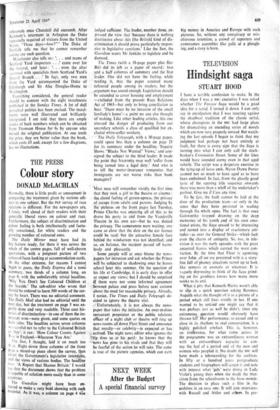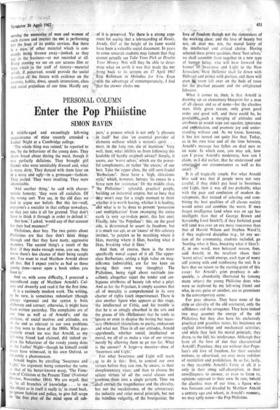Hindsight saga
TELEVISION STUART HOOD
I have a terrible confession to make. In the days when I was a BBC executive I was asked whether The Forsyte Saga would be a good
idea for a serial. I turned it down. I can only say in exculpation that I was reacting against the deadbeat tradition of the classic serial,
whose champions in the BBC had large plans for dramatising an unending series of novels which are now very properly unread. But watch- ing the last episode I began to think that my judgment had perhaps not been entirely at fault, for there is every sign that the Saga is turning into what I can only call the stock- broker's Coronation Street. Some of the lines would have sounded corny even in that aged vehicle. The script was a desperate exercise in the tying-up of loose ends. Nyree Dawn Porter seemed not so much to have aged as to have been embalmed. In fact, from the ghastly good taste of the opening title sequence onwards there was more than a whiff of the undertaker's parlour. Give me Z Cars any time.
To be fair, the fault cannot be laid at the door of the production team—or only in the sense that they have persisted in wading through the whole opus. The fact is that once Galsworthy stopped drawing on the deep memories of his youth and of his own emo- tional crises, the Saga ceased to be interesting and turned into a display of reactionary atti- tudes—as over the General Strike—which lack even the charm of antiquity. So, too, in tele- vision it was the early episodes with the great ancestral figures which carried the most con- viction. By the time that Fleur is agonising over John, all we are presented with is a story- line full of phoney situations tarred up to look . like nemesis or anangke or whatever. It is vaguely depressing to think of the Saga grind- ing on for goodness knows how many more weeks to its end.
What a pity that Kenneth Harris wasn't able to slip in a quick question asking Baroness Asquith what she thought of it as a picture of a period which still lives vividly in her. If one wanted to be unkind one might say that it was perhaps just as well he didn't, since any extraneous question would obviously have thrown h4. Her performance, so casual and so close in its rhythms to real conversation, is a highly polished artefact. This is, however, an irrelevance, for what, came across in the programme was an extraordinary woman with an extraordinary capacity to con- vey the feel of a period and of the men and women. who peopled it. No doubt the sac will have made a telerecording for the archives. In fifty or a hundred years postgraduate students and biographers will screen it and note with interest what 'gels' were doing in Lady Violet's young days when she made the tran- sition from the schoolroom to the beau monde. The decision to place such a film in the archives is an easy one. It will join interviews with Russell and Attlee and others. In pre- serving the memories of men and women of such stature and interest the BBC is performing not the least of its public services. But there is a mass of other material which is con- stantly being thrown away—junked, as they say in the business—or not recorded at all. Every evening we see on our screens film or tape; which is the stuff of history—material which, if preserved, would provide the social historrian of the future with evidence on the customs, habits, dress, speech intonations, class and social prejudices of our time. Hardly any of it is preserved. Yet there is a strong argu- ment for saying that a telerecording of Ready, Steady, Go! at the height of its fame would have been a valuable social document. In years to come research students may lament that they cannot actually see Take Your Pick or Double Your Morley. Nor will they be able to deter- 'mine what OR earth it was that made the BBC „bring back to its screens on 17 April 1967 Robinson in' Melodies for You. Even 'if with the advantage of contemporaneity, I find at the answer eludes me.







































 Previous page
Previous page